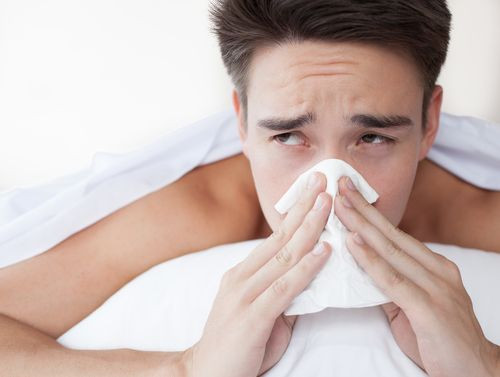Is 'Man Flu' Real Or Just Another Fantasy Used To Turn Things Masculine?

Some people believe that along with all the usual sex differences between men and women, there’s also a gender line — or barricade, as the case may be — drawn around illness. Not only are men from Mars and women from Venus when it comes to communication styles, but our sicknesses come from different planets as well. For many, the idea of man flu makes perfect sense. After all, guys are generally bigger and stronger than gals, so it only seems logical that man-germs must be bigger and stronger, too. Hey, and what about Superman? Only a special substance, kryptonite, could take down the superhero, so it only follows that the kind of microbes capable of knocking out all the regular Joes must be specially reserved guy-only bugs, too. Right? Right?
Could there be even a jot of truth to the idea of man flu? The notion first gained legs as a result of a 2006 readers’ poll conducted by the now defunct Nuts Magazine. The poll of 2,000 people found that 64 percent of all male respondents had gleefully skipped a day of work in the previous year thinking they had the flu, whereas less than half (45 percent) of women respondents had done the same. This admittedly non-scientific survey also found that men generally complained more when sick, spent more on remedies, and were more likely to remain in bed until they felt better.
People reacted strongly to the results of this poll. Fingers wagged, backs turned, jaws clamped shut. Of course, there were those who immediately challenged the numbers. After all, anyone who knows even one mother, a stay-at-home father or two, and a handful of teachers knows that answering the question of which adults get sick most often has nothing to do with gender. It’s all about who is spending time hanging around kids, picking up all the radioactive germs the little ones seem to produce. By that count, women get sick with colds and flu viruses far more often than men. Still, this perspective, righteous though it may be, doesn’t answer the matter of strength of illness. Do men feel their illnesses more strongly?
The debate raged on until scientists jumped into the game of deciding whether man flu really exists or whether it’s just a ghost haunting the imaginations of a few comic-strip reading men (and their eye-rolling partners). Two researchers at the University of Cambridge tackled the subject and published their results in 2010. They determined that men have weaker immune systems than women and therefore suffer disease more seriously and for longer. More importantly, the reason men have weaker defenses against disease as compared to women is due to sex-specific natural selection. (Think back to biology: characteristics survive based on who reproduces and passes on their traits.)
Among different species, males who display more adventurous behavior are generally more attractive to females, yet this spirited style also means they are more exposed to infection than females. Maintaining the ability to mate is also key to males of all species. This not only means competition with other men, it also means more sex-selection of those men who invest less energy in getting well when sick and instead invest more of their energy into continuing to mate while sick (well, yuck!). In the end, all this means is that through evolutionary adaptations, men are the weaker sex when it comes to illness.
If all that evolutionary biology is too much for you, consider another study from the same year. A team of Australian researchers found that pre-menopausal women have a stronger immune response to rhinovirus infections, which cause the common cold, when compared to both men and older people of both sexes. Although they could not figure out exactly why this came to be so, they did say, in the plainest of English, “sex and age matter” when it comes to getting sick with infectious illnesses.
Does man flu really exist? You bet it does.
Published by Medicaldaily.com



























